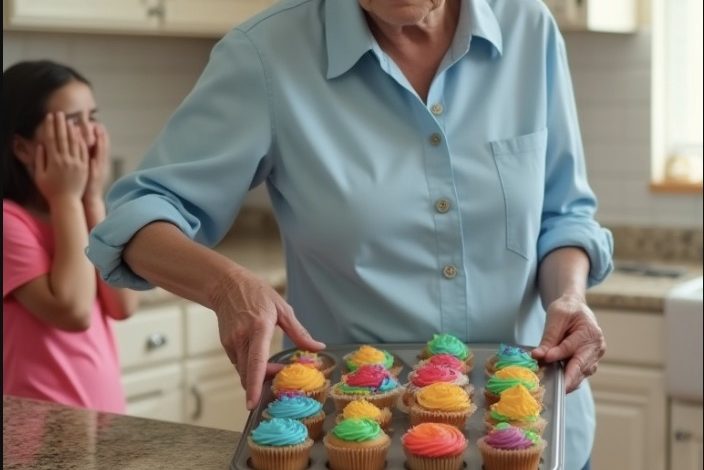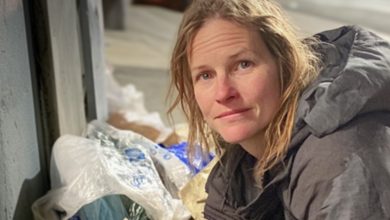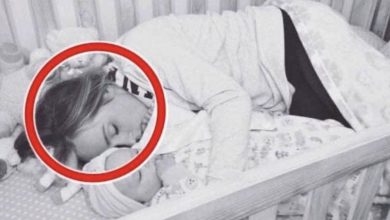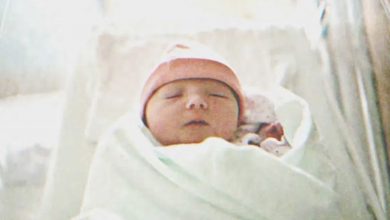They Laughed When My 8-Year-Old Brought Cupcakes to Dinner — But That Night, I Finally Stood Up for Both of Us

That Sunday dinner was supposed to be ordinary — another evening of polite smiles, family chatter, and too much food. But it became the night I finally stopped pretending.
It started like any other family gathering: my mother’s voice carrying from the kitchen, the smell of roast chicken filling the house, my sister Monica talking too loudly. My husband, Evan, held the door open as our eight-year-old daughter, Chloe, walked in carefully, clutching a foil-covered tray. She wouldn’t let me hold it, not even for a second. Those cupcakes were her pride and joy.
She’d spent five hours making them that morning. Three batches had ended up in the trash, each failure teaching her something new. The fourth batch, though, was perfect — at least to her. The frosting was uneven, some cupcakes smaller than others, but the smell of vanilla filled our kitchen like hope itself. When she finished, she said, “They’re for Grandma’s dinner. Everyone’s going to love them.”
When we stepped into my mother’s dining room, the noise dimmed just for a second. My mother, Janet, smiled her polished, hostess smile — the kind that never reached her eyes. “You’re finally here!” she said. “Traffic must have been terrible.”
I smiled back, pretending not to feel that familiar tension in my stomach. “Almost,” I said.
Chloe stood by my side, bouncing slightly on her toes. She was nervous and excited all at once. “I made dessert,” I said, resting a hand on her shoulder. “All by herself.”
“Oh, how sweet,” my mother said. Monica, seated across the table, raised one eyebrow. “How ambitious,” she murmured.
Chloe peeled back the foil carefully. The cupcakes weren’t perfect — some tilted a little to one side, the frosting swirled unevenly — but they smelled amazing. For a moment, I thought the sight might melt my mother’s icy composure. It didn’t.
My ten-year-old niece, Sienna, wrinkled her nose. “Are they gluten-free?”
I blinked. “No. Why?”
“Mom says I’m not doing gluten this week,” Sienna said proudly.
Monica smiled indulgently. “It’s true. We’re being careful.”
I looked at Sienna’s plate — half a dinner roll, mashed potatoes, and gravy. “That roll’s not exactly gluten-free,” I said quietly.
Monica’s expression hardened. “Well, Mom made those. It’s different.”
My mother nodded quickly, clearly eager to move on. “Sweetheart,” she told Chloe, “it’s so lovely that you tried. But we already have so much food. Let’s just set these aside for now, okay?”
Before I could speak, she lifted the tray — gracefully, as if performing an act of mercy — and disappeared into the kitchen.
The conversation started up again, louder than before. Chloe sat beside me, folding her napkin into tiny squares. Her lip trembled just slightly. I put a hand on her back. “It’s fine, honey,” I whispered. “They’re just full.”
But I didn’t believe it.
A few minutes later, I stood to “get more napkins.” No one even looked up. In the kitchen, I stopped cold. The trash can lid was half-open. I saw frosting first — white smears against black plastic. Crushed paper liners. A hint of pink sprinkles. My stomach dropped.
Then I heard soft footsteps. Chloe stood in the doorway, her eyes moving from the trash to me. She didn’t cry. She didn’t say a word. She just froze, her face pale and still.
“Sweetheart,” I began, but my voice cracked. She turned and walked away before I could finish.
When I came back to the table, Chloe sat perfectly still, hands folded in her lap. Her fork was untouched. My sister was talking about how important it was to teach children “high standards.” My mother nodded like she was hearing scripture.
Something in me snapped.
“Monica,” I said lightly, “are you sure you don’t want one of Chloe’s cupcakes before they’re all gone?”
She froze for a moment. Then she smiled, brittle and fake. “I think I’ve had enough sugar for the year. She’ll get better when she’s older.”
That sentence landed like a slap. Around the table, everyone laughed politely, pretending the air hadn’t just turned sharp. Chloe pressed her napkin to her mouth, trying to hide the trembling of her chin.
I picked up my wine glass. My voice came out calm, almost too calm. “I’d like to make a toast.”
Every fork stopped. My father glanced at me, confused.
“To the last time you’ll ever see us again,” I said.
The silence was so deep it hurt my ears.
My mother’s smile fell away. “Jody, stop this nonsense,” she said sharply. “We have standards in this family.”
I met her gaze. “You do, Mom. And you’re about to learn how expensive those standards are to maintain without me.”
I took Chloe’s small hand and stood. Evan followed, speechless but supportive. We walked down the hallway lined with family photos — the perfect smiles, the fake happiness — and out the front door. It didn’t slam. It just clicked shut, final and soft.
Outside, the air felt cold but freeing. In the car, Chloe stared straight ahead. She didn’t cry, but I saw her reflection in the window — her little face tight with sadness. I reached back and squeezed her hand. “You did nothing wrong,” I said quietly.
That night, I couldn’t sleep. Memories kept flashing through my head — my mother’s sharp voice when I was a child, the way every mistake became proof of my failure. If it’s worth doing, it’s worth doing perfectly. She said it so often it became a commandment.
When I was ten, I’d spent hours on a math worksheet. One small eraser smudge — and she’d made me start over. When I cried, she handed me a new sheet, silent and unmoved. That was love in our house: control wrapped in calm voices.
Monica, the younger one, was always forgiven. When she forgot something, Mom would laugh softly. “She’s still little.” When I did, it was, “You should know better.” My father never interfered. His silence was his approval.
Now, decades later, I realized nothing had changed. Only the target had. My mother wasn’t teaching “standards.” She was teaching shame. And she’d just passed that lesson to my daughter.
The next morning, I made coffee, sat at the kitchen table, and opened my laptop. My hands were shaking as I logged into the bank account I used to help my parents. For years, I’d sent them money for their mortgage, for “emergencies,” for Monica’s crises. It was never optional — it was expected.
Click. Cancel. Confirm. I stopped every automatic payment.
When Evan walked in, I said simply, “I’m done.”
That afternoon, the phone started ringing. I didn’t answer.
The next day, my mother left a voicemail. “You’ve embarrassed this family,” she said coldly. “Throwing away a few cupcakes isn’t the end of the world. We were trying to teach her discipline.”
I deleted it.
Then came my father’s call. “Your mother’s upset. You should apologize. You know how she is.”
“I do,” I said. “That’s the problem.”
He hesitated. “We noticed the mortgage payment didn’t come through this month.”
“That’s right,” I said.
“Well, maybe just for now — until things calm down—”
“No.”
He sighed. “You wouldn’t have this good life if we hadn’t pushed you. We taught you discipline. You should be grateful.”
“I’m successful despite you,” I said quietly. “Not because of you.”
He didn’t answer. When I hung up, my heart was pounding, but my hands were steady.
Two days later, I checked my account. Twelve thousand dollars — gone. Moved to my parents’ names. My breath caught. Years ago, when Chloe was a baby, I’d given them temporary power of attorney “just in case.” Apparently, in case had finally arrived.
I called immediately. My father answered, calm as ever. “Don’t make a fuss, Jody. We just needed to cover some repairs.”
“You took my money,” I said.
He sighed. “You’ve always helped before. Stop being dramatic.”
Then my mother’s voice joined in, syrupy sweet. “It’s only money, sweetheart. You know we love you. We just wanted things handled properly.”
That word — properly — hit like a punch.
“You didn’t want things handled properly,” I said. “You wanted control.”
“Watch your tone,” my father warned.
“I have,” I said, my voice cold. “My whole life.” And I hung up.
The next morning, I went to a lawyer. The power of attorney had long expired. What they did was theft. My lawyer sent a letter. Within a week, half the money was returned, with promises to repay the rest “soon.” It was all suddenly a “misunderstanding.”
The family gossip network came alive. Texts from aunts and uncles poured in — Your parents are heartbroken. How could you do this to them? Monica even posted online: Some people forget who raised them.
I ignored them all. For the first time, their noise didn’t reach me.
Months passed. My parents sold their house and moved away. The calls stopped. The silence that followed wasn’t emptiness — it was peace.
One evening, Chloe dropped a glass of milk in the kitchen. It shattered. She froze, wide-eyed, waiting for me to scold her.
I smiled. “It’s fine. We’ll clean it up.”
Her mouth fell open. “That’s it?”
“That’s it.”
She grinned, a real, unguarded smile. Something loosened in my chest.
Evan came in, leaning on the doorway. “You two okay?”
“We’re perfect,” I said, meaning it for the first time.
He smiled. “You look lighter.”
Maybe I was. Maybe, after all those years of carrying other people’s expectations, I had finally set them down.
I thought of Chloe’s cupcakes — lopsided, uneven, full of love. The way she’d looked at them before my mother threw them away. And I realized something: perfection never feeds anyone. Love does.
That night, Chloe and I baked again. She measured flour, I cracked the eggs. We laughed when the frosting went crooked. And when we finally sat down to taste them, she said, “These are better than before.”
“They’re perfect,” I said.
And for once, the word meant exactly what it should.










